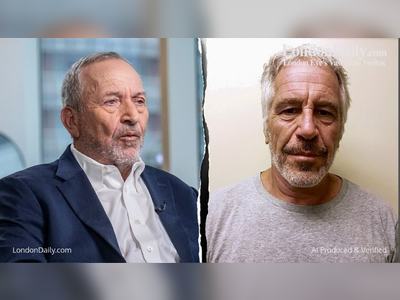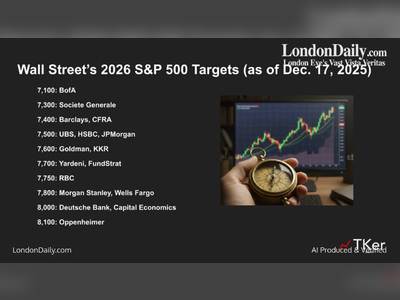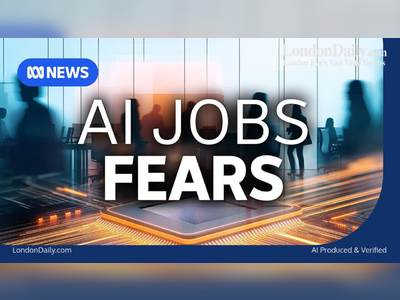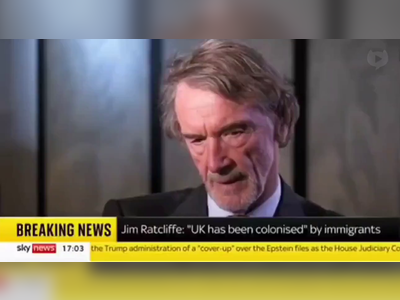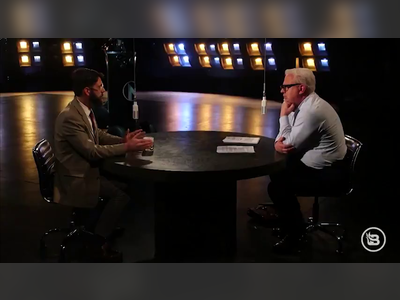
World’s Biggest IPO Tests Saudis’ Faith in Their Crown Prince
Mohammed bin Salman’s overhaul of the kingdom is in its fourth year and selling shares in the national oil giant is vital.
Nawaf Abdel-Aziz has never put any money into the stock market before, but he says buying shares in the world’s most profitable company is a no-brainer.
The 29-year-old engineer from Riyadh is among the Saudi faithful waiting to get a piece of Crown Prince Mohammed bin Salman’s much vaunted-and delayed-sale of a stake in oil giant Aramco. The initial public offering, likely the biggest in history, is expected to get the green light in coming days.
“It's not a random investment,” said Abdel-Aziz, as he and a friend waited for a table at a burger and sushi place in a swanky open-air mall in the Saudi capital. “The company has a history. It’s very stable. We can see where they’re headed.”
The frenzy of excitement across the kingdom and social media over the IPO is only eclipsed by its importance. Indeed, in Saudi Arabia there’s a fine line between savvy investing and patriotic duty when your leader has so much riding on its success.
Aramco underpins Prince Mohammed’s overhaul of the economy that’s now into its fourth year and some critics of the sale have ended up in jail, though no charges were disclosed. Suggestions it won’t meet the huge $2 trillion valuation are treated as dissent against the prince, who has repeated the number in interviews for years. Everyone is being encouraged to invest in the kingdom’s most important asset.
Nawaf Abdel-Aziz has never put any money into the stock market before, but he says buying shares in the world’s most profitable company is a no-brainer.
The 29-year-old engineer from Riyadh is among the Saudi faithful waiting to get a piece of Crown Prince Mohammed bin Salman’s much vaunted—and delayed—sale of a stake in oil giant Aramco. The initial public offering, likely the biggest in history, is expected to get the green light in coming days.
“It's not a random investment,” said Abdel-Aziz, as he and a friend waited for a table at a burger and sushi place in a swanky open-air mall in the Saudi capital. “The company has a history. It’s very stable. We can see where they’re headed.”
The frenzy of excitement across the kingdom and social media over the IPO is only eclipsed by its importance. Indeed, in Saudi Arabia there’s a fine line between savvy investing and patriotic duty when your leader has so much riding on its success.
Aramco underpins Prince Mohammed’s overhaul of the economy that’s now into its fourth year and some critics of the sale have ended up in jail, though no charges were disclosed. Suggestions it won’t meet the huge $2 trillion valuation are treated as dissent against the prince, who has repeated the number in interviews for years. Everyone is being encouraged to invest in the kingdom’s most important asset.
Many Saudis see the IPO as a demonstration of loyalty as tension mounts in the Gulf. It will come weeks after a crippling aerial assault on oil installations that the government has blamed on Iran. On Friday, an Iranian oil carrier was hit by missiles in the Red Sea and the Islamic Republic’s tanker company initially pointed the finger at Saudi Arabia before withdrawing the claim.
There’s also been pressure on the Saudis from their allies after the kingdom was excoriated internationally for the murder of newspaper columnist Jamal Khashoggi just over a year ago and the jailing of women’s rights activists.
“It’s a Saudi company so I feel a national duty to invest in it,” said Mashael, a 28-year-old Riyadh resident.
For the crown prince, it’s all about Saudi Arabia’s transition to Western-style capitalism. The next stage is to turn people into shareholders, much like during the 1980s when the stock market became a national pastime for Americans or Britain sold off its utilities to the public.
Anticipation has been building. Saudis are asking questions on Twitter about the offering using an Arabic-language hashtag for the IPO. Some seek advice on whether to put all their savings into it, and what to do if there’s another delay. Self-styled analysts offer their thoughts and urge Saudis to invest.
There’s even the usual scams: a columnist for Saudi newspaper Aleqtisadiya warned would-be investors in a tweet about falling for groups offering Aramco shares at a discount.
Abdullah AlZailaie, a 28-year-old doctor from Abha in the southwest of the country, said people are divided over the Aramco sale but he knows some who have even postponed home purchases just to invest. AlZailaie wants to spend 100,000 riyals ($26,600) on buying shares and if he can’t find the money he will borrow from a bank, many of which are expected to offer credit to boost liquidity for the sale.
“It will be a monumental event in the kingdom’s history and Saudi investors should take pride in the fact that they own shares in a global institution that has played a significant role in the kingdom's transformation,” said Abdullah AlGhamdi, 34, a legal adviser in Riyadh.
Such a glowing endorsement, however, is not shared by everyone. The IPO plan will still face significant hurdles, including the ability of the kingdom to achieve the $2 trillion valuation it’s been seeking for the company. Demand for the share sale would also likely be affected by lower oil prices as well as growing concerns among top institutional investors about pouring money into fossil-fuel companies that contribute to climate change.
In Riyadh, one Saudi businessman said there’s still some uncertainty over the financial allure to local investors even after the announcement of Aramco’s intention to pay out $75 billion in dividends next year. An investment adviser in Saudi Arabia said the giant valuation and low oil prices makes the offering unattractive. Both spoke on condition of anonymity.
Saudi businessman Essam Al Zamil was jailed in September 2017 after months of sharing sometimes critical analysis of the government’s economic policies on social media, including the Aramco IPO. In 2016, he posted a series of tweets, later deleted, in which he said it would be impossible for Aramco’s valuation to reach $2-3 trillion without including “even the rights to the oil under the ground.” He opposed that idea and argued that the oil was “the property of the people.”
Jamil Farsi, another Saudi businessman, was also arrested in 2017, several months after he had made a public plea not to sell Aramco in an IPO at a Jeddah Chamber of Commerce meeting. Charges against both Al Zamil and Farsi were not publicly disclosed, so it’s unclear if the arrests were related to their stance on the IPO.
Saudi Aramco’s board is expected to meet with its advisers around Oct. 17, according to people familiar with the planning. Then there will be a countrywide advertising blitz to drum up investment from Saudi citizens, who have shown before they have the resources to make an IPO a success.
When National Commercial Bank was sold in 2014, the transaction was restricted to only local retail investors. It still managed to attract 311 billion riyals of bids, making it 23 times oversubscribed, partly because banks offered loans to take part in the IPO. The subscription for the NCB offering would be enough to cover the entire Aramco IPO twice, even at a $2 trillion valuation.
“When you talk about Aramco, you talk about almost the main source of revenue for the kingdom of Saudi Arabia,” said Eid Al Shamri, chief executive of investment bank Ithraa Capital. “It’s as if you’re buying the main revenue of Saudi, and in my opinion the $2 trillion is a cheap one.”
The 29-year-old engineer from Riyadh is among the Saudi faithful waiting to get a piece of Crown Prince Mohammed bin Salman’s much vaunted-and delayed-sale of a stake in oil giant Aramco. The initial public offering, likely the biggest in history, is expected to get the green light in coming days.
“It's not a random investment,” said Abdel-Aziz, as he and a friend waited for a table at a burger and sushi place in a swanky open-air mall in the Saudi capital. “The company has a history. It’s very stable. We can see where they’re headed.”
The frenzy of excitement across the kingdom and social media over the IPO is only eclipsed by its importance. Indeed, in Saudi Arabia there’s a fine line between savvy investing and patriotic duty when your leader has so much riding on its success.
Aramco underpins Prince Mohammed’s overhaul of the economy that’s now into its fourth year and some critics of the sale have ended up in jail, though no charges were disclosed. Suggestions it won’t meet the huge $2 trillion valuation are treated as dissent against the prince, who has repeated the number in interviews for years. Everyone is being encouraged to invest in the kingdom’s most important asset.
Nawaf Abdel-Aziz has never put any money into the stock market before, but he says buying shares in the world’s most profitable company is a no-brainer.
The 29-year-old engineer from Riyadh is among the Saudi faithful waiting to get a piece of Crown Prince Mohammed bin Salman’s much vaunted—and delayed—sale of a stake in oil giant Aramco. The initial public offering, likely the biggest in history, is expected to get the green light in coming days.
“It's not a random investment,” said Abdel-Aziz, as he and a friend waited for a table at a burger and sushi place in a swanky open-air mall in the Saudi capital. “The company has a history. It’s very stable. We can see where they’re headed.”
The frenzy of excitement across the kingdom and social media over the IPO is only eclipsed by its importance. Indeed, in Saudi Arabia there’s a fine line between savvy investing and patriotic duty when your leader has so much riding on its success.
Aramco underpins Prince Mohammed’s overhaul of the economy that’s now into its fourth year and some critics of the sale have ended up in jail, though no charges were disclosed. Suggestions it won’t meet the huge $2 trillion valuation are treated as dissent against the prince, who has repeated the number in interviews for years. Everyone is being encouraged to invest in the kingdom’s most important asset.
Many Saudis see the IPO as a demonstration of loyalty as tension mounts in the Gulf. It will come weeks after a crippling aerial assault on oil installations that the government has blamed on Iran. On Friday, an Iranian oil carrier was hit by missiles in the Red Sea and the Islamic Republic’s tanker company initially pointed the finger at Saudi Arabia before withdrawing the claim.
There’s also been pressure on the Saudis from their allies after the kingdom was excoriated internationally for the murder of newspaper columnist Jamal Khashoggi just over a year ago and the jailing of women’s rights activists.
“It’s a Saudi company so I feel a national duty to invest in it,” said Mashael, a 28-year-old Riyadh resident.
For the crown prince, it’s all about Saudi Arabia’s transition to Western-style capitalism. The next stage is to turn people into shareholders, much like during the 1980s when the stock market became a national pastime for Americans or Britain sold off its utilities to the public.
Anticipation has been building. Saudis are asking questions on Twitter about the offering using an Arabic-language hashtag for the IPO. Some seek advice on whether to put all their savings into it, and what to do if there’s another delay. Self-styled analysts offer their thoughts and urge Saudis to invest.
There’s even the usual scams: a columnist for Saudi newspaper Aleqtisadiya warned would-be investors in a tweet about falling for groups offering Aramco shares at a discount.
Abdullah AlZailaie, a 28-year-old doctor from Abha in the southwest of the country, said people are divided over the Aramco sale but he knows some who have even postponed home purchases just to invest. AlZailaie wants to spend 100,000 riyals ($26,600) on buying shares and if he can’t find the money he will borrow from a bank, many of which are expected to offer credit to boost liquidity for the sale.
“It will be a monumental event in the kingdom’s history and Saudi investors should take pride in the fact that they own shares in a global institution that has played a significant role in the kingdom's transformation,” said Abdullah AlGhamdi, 34, a legal adviser in Riyadh.
Such a glowing endorsement, however, is not shared by everyone. The IPO plan will still face significant hurdles, including the ability of the kingdom to achieve the $2 trillion valuation it’s been seeking for the company. Demand for the share sale would also likely be affected by lower oil prices as well as growing concerns among top institutional investors about pouring money into fossil-fuel companies that contribute to climate change.
In Riyadh, one Saudi businessman said there’s still some uncertainty over the financial allure to local investors even after the announcement of Aramco’s intention to pay out $75 billion in dividends next year. An investment adviser in Saudi Arabia said the giant valuation and low oil prices makes the offering unattractive. Both spoke on condition of anonymity.
Saudi businessman Essam Al Zamil was jailed in September 2017 after months of sharing sometimes critical analysis of the government’s economic policies on social media, including the Aramco IPO. In 2016, he posted a series of tweets, later deleted, in which he said it would be impossible for Aramco’s valuation to reach $2-3 trillion without including “even the rights to the oil under the ground.” He opposed that idea and argued that the oil was “the property of the people.”
Jamil Farsi, another Saudi businessman, was also arrested in 2017, several months after he had made a public plea not to sell Aramco in an IPO at a Jeddah Chamber of Commerce meeting. Charges against both Al Zamil and Farsi were not publicly disclosed, so it’s unclear if the arrests were related to their stance on the IPO.
Saudi Aramco’s board is expected to meet with its advisers around Oct. 17, according to people familiar with the planning. Then there will be a countrywide advertising blitz to drum up investment from Saudi citizens, who have shown before they have the resources to make an IPO a success.
When National Commercial Bank was sold in 2014, the transaction was restricted to only local retail investors. It still managed to attract 311 billion riyals of bids, making it 23 times oversubscribed, partly because banks offered loans to take part in the IPO. The subscription for the NCB offering would be enough to cover the entire Aramco IPO twice, even at a $2 trillion valuation.
“When you talk about Aramco, you talk about almost the main source of revenue for the kingdom of Saudi Arabia,” said Eid Al Shamri, chief executive of investment bank Ithraa Capital. “It’s as if you’re buying the main revenue of Saudi, and in my opinion the $2 trillion is a cheap one.”



